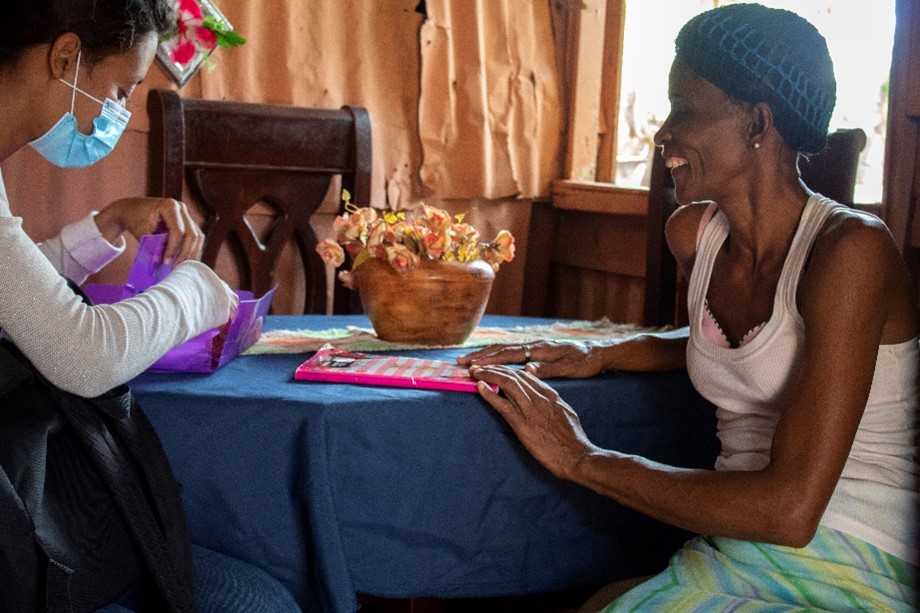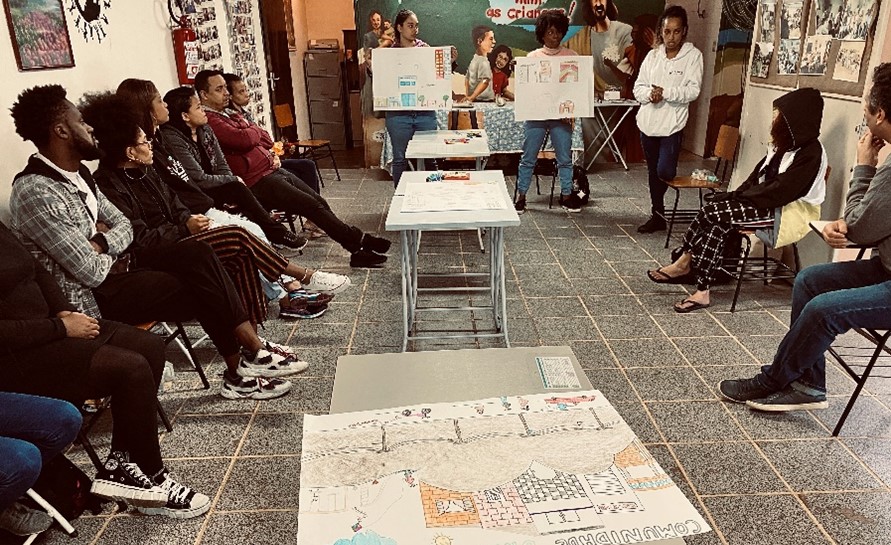Zeroing In: Latin America & The Caribbean (LAC) Region

This new funding opportunity builds on Gilead’s previous global Zeroing In™ grant program to support organizations working to increase the overall health and wellness of priority populations that have been most impacted by HIV.
View the full Funding Opportunity Announcement for the Zeroing In grant program in Latin America and the Caribbean (LAC):
Program and Purpose
Gilead seeks to provide support to LAC-based not-for-profit organizations registered with a charitable status to receive U.S./international funds whose programs are community-driven; align with established global health and HIV goals, as well as local health priorities and strategies; and promote evidence-based strategies for HIV prevention and care.
Projects should focus on one or more of the overall Zeroing In: LAC program goals:
- Improve access to comprehensive care among priority populations most affected by HIV.
- Decrease stigmatization of HIV patients within LAC region.
- Address inequities in HIV screening, diagnostics and care.
Projects must prioritize key populations most affected by HIV (e.g., MSM, transgender women, sex workers, people who inject drugs and their sexual partners, aging, indigenous or migrant populations), be informed by local needs and align to one or more of the following three activity focus areas:
- Innovate comprehensive HIV programs
- Culturally and socially-affirming support services
- Community outreach and education

Clinica de Familia La Romana, Zeroing In Grantee (Dominican Republic)
Gilead recognizes the vital role community-based and grassroots organizations play in delivering high-quality, supportive HIV prevention and care services to key populations. In order to enable the development of innovative and effective proposals, we encourage collaboration and partnerships between organizations.
About the Grant
We believe that people should have access to the same quality healthcare, regardless of their background and circumstances. Through the Zeroing In: Ending the HIV Epidemic (EHE) grant program, we have awarded grants to help reduce health disparities, improve access to quality healthcare, advance medical education and support local communities. Zeroing In supports 116 organizations and partners across 47 countries who are striving to help end the HIV epidemic.
Gilead is focusing the next phase of its Zeroing In grant program in Latin America and the Caribbean (LAC). This region has significant need for improved HIV prevention, treatment and support services. Latin America has 2.2 million people living with HIV, almost as many as North America and Western and Central Europe combined.1 New HIV infections increased by 5% in Latin America from 2010 to 2021, while declining globally by 32% in the same timeframe.1,2 While the HIV response in the Caribbean has improved significantly since 2010, it has the highest HIV prevalence of any region outside of sub-Saharan Africa.1
1UNAIDS Data Reference, UNAIDS, 2022
2UNAIDS Global HIV & AIDS statistics – Fact sheet
Gilead will consider grant requests up to $100,000 from individual organizations and up to $250,000 for collaborative requests that include two or more organizations. Projects must begin in the first three months of 2024 (January, February, March), and have a timeline for completion of up to, but no more than, 18-months from project start date. Grant proposals should clearly articulate how the project will be sustained at the end of the project. Projects of a shorter length will also be considered on a case-by-case basis. Grant requests should be proportional to the scope, complexity and reach/impact of the program and country, while reflecting reasonable, good faith estimates of the true costs related to the proposed project. Giving will be distributed in accordance with local regulations which can vary by country.

Projeto Bem Me Quer, Zeroing In™ grantee (Brazil)
Eligibility and Selection Criteria

Source: UNAIDS Country Factsheet, UNAIDS, 2022
Organization(s) must have an active status as a not-for-profit and have an interest and history working in public health, including but not limited to providing social services, education or advocacy for underserved populations. They must be headquartered in one of the countries listed in Appendix B of the FOA. Collaborative submissions are encouraged.
Eligible organizations must demonstrate:
- A proven track record of sound financial stewardship and ability to deliver impactful programming;
- That they have proven excellence in program development and implementation, when and where applicable;
- That they have been established for at least two calendar years;
- Institutional infrastructure, including administrative capacities and a track record of delivering successful programs;
- Core content expertise and strong grounding in existing data and methodologies in HIV prevention and care;
- A strong network of partners and demonstrated ability to collaborate effectively
Gilead seeks an equitable balance between large and small organizations receiving funding, so organizations of a range of sizes/income levels are welcome to apply. Additionally, applications for programs and initiatives that have multiple sources of funding are encouraged.
Questions related to the 2023 LAC Funding Opportunity Announcement should be directed to grants@gilead.com using the subject heading “LAC---Zeroing In".
Gilead welcomes proposals that target specific activities aimed at improving health outcomes throughout LAC aligned with at least one of the key focus areas noted above. Projects should intend to support key populations who face health inequities as designated by local or global HIV strategies. Successful proposals will:
- Make a unique and important contribution to help end the HIV epidemic that is articulated in the proposal
- Offer specific, measurable, time-bound program objectives and implementation plan
- Include staff expertise and experience who have available time to commit to the proposed project scope
- Assume appropriate and practical resourcing and budgets, with the potential for scalability
- Include a dissemination plan to share learnings and best practices from grant-funded activities
- Demonstrate original, innovative ideas that are suitable for the existing local infrastructure, capacity, environment and context
- Consider any necessary government resources (infrastructure, human resources or funding) that are required and, if applicable, those that have been identified and are available
- Have strong mechanisms to ensure financial, performance and public accountability
- Provide a clear transition plan for long-term sustainability
- Specify the short-term outcomes and anticipate impact to be achieved through the funding
- Be willing to participate in program evaluation efforts
- Emphasize collaboration between partners and a shared vision for success, where applicable
- Any letters of support, including from public sectors, community groups and partner organizations, will be considered when selecting applications. Community-led efforts are encouraged.
Gilead funding cannot support:
- Medications or purchasing of medications
- Direct medical expenses, including labs
- Existing deficits
- Basic biomedical research, Gilead-sponsored clinical research or clinical trials
- Projects that directly influence or advance Gilead’s business, including purchase, utilization, prescribing, formulary position, pricing, reimbursement, referral, recommendation or payment for products
- Individuals (including, without limitation: individual health care providers, physician group practices and/or government officials) or their salaries
- Events or programs that have already occurred
- Government lobbying activities
- Organizations that discriminate on the basis of race, color, gender, religion, disability, sexual orientation, or gender identity or expression.
- How will the award be determined?
- Gilead welcomes proposals that target specific activities aimed at improving health outcomes throughout LAC aligned with at least one of the key focus areas noted above. Projects should intend to support key populations who face health inequities as designated by local or global HIV strategies. Successful proposals will:
- Make a unique and important contribution to help end the HIV epidemic that is articulated in the proposal
- Offer clear program objectives and implementation plan
- Include staff expertise and experience in line with the proposed project scope
- Assume appropriate and practical resourcing and budgets, with the potential for scalability
- Include a dissemination plan to share learnings and best practices from grant-funded activities
- Demonstrate original, innovative ideas that are suitable for the existing local infrastructure, capacity, environment and context
- Consider any necessary government resources (infrastructure, human resources or funding) that are required and, if applicable, those that have been identified and are available
- Have strong mechanisms to ensure financial, performance and public accountability
- Provide a clear transition plan for long-term sustainability
- Emphasize collaboration between partners and a shared vision for success, where applicable
- Any letters of support will be considered when selecting applications. Community-led efforts are encouraged.
- Gilead welcomes proposals that target specific activities aimed at improving health outcomes throughout LAC aligned with at least one of the key focus areas noted above. Projects should intend to support key populations who face health inequities as designated by local or global HIV strategies. Successful proposals will:
- What is the amount of the grant?
- Gilead will consider grant requests up to $100,000 from individual organizations and up to $250,000 for collaborative requests that include two or more organizations
- Can my organization submit more than one project?
- No, you can only submit one project
- Can a for-profit organization apply?
- Organization(s) must have active status as a not-for-profit and have an interest in public health, including but not limited to providing social services, education or advocacy for underserved populations
- How can I obtain the FOA document?
- Please download the 2023 FOA document here.
- Can I apply with ongoing or finished projects?
- Gilead does not provide retroactive grants for finished projects, however requests for support for ongoing projects may be submitted
- If more than one project event will be launched on more than one date and place, should I submit multiple applications?
- Projects with multiple events, dates or locations should be submitted in a single, complete application.
- Is it OK to submit an annual budget in place of a project budget?
- No. In order for a grant application to be considered, you must submit a detailed project budget including a breakdown of the use of funds requested from Gilead.
- Can I upload attachments when I apply?
- Yes, supplementary documents can be uploaded alongside the application form in the online portal.
- How will I be informed of the grant award decisions?
- Notifications of funding decisions will be done through the Gilead Grant portal.
- Can I discuss my application with Gilead representatives?
- Gilead representatives can provide technical assistance but cannot comment on the award application content.
- How can I obtain the FOA document?
- Please download the 2023 FOA document by selecting one of the three languages: English, Portuguese or Spanish.
2021 Global Zeroing In Program Details
Instructions to view the page in Portuguese or Spanish.
